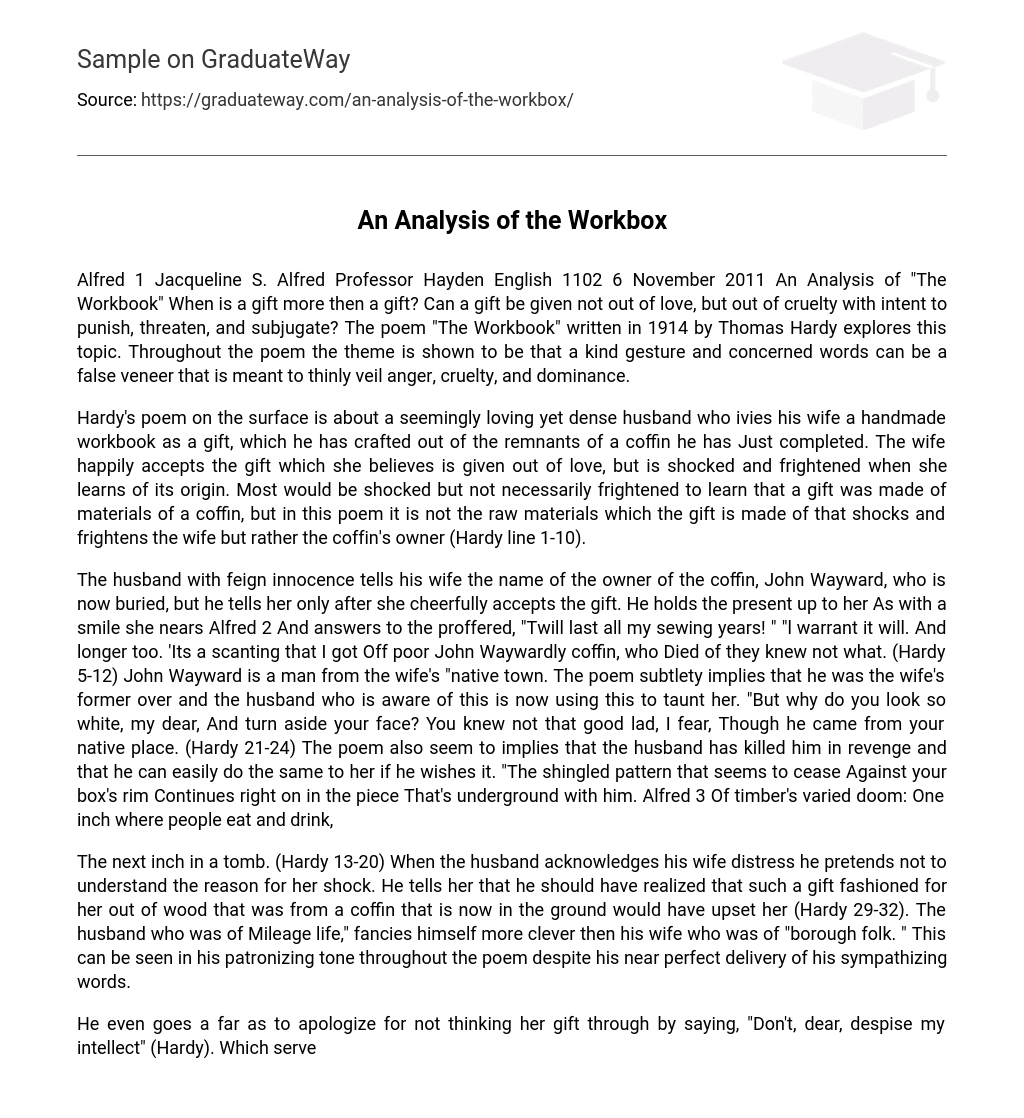Alfred 1 Jacqueline S. Alfred Professor Hayden English 1102 6 November 2011 An Analysis of “The Workbook” When is a gift more then a gift? Can a gift be given not out of love, but out of cruelty with intent to punish, threaten, and subjugate? The poem “The Workbook” written in 1914 by Thomas Hardy explores this topic. Throughout the poem the theme is shown to be that a kind gesture and concerned words can be a false veneer that is meant to thinly veil anger, cruelty, and dominance.
Hardy’s poem on the surface is about a seemingly loving yet dense husband who ivies his wife a handmade workbook as a gift, which he has crafted out of the remnants of a coffin he has Just completed. The wife happily accepts the gift which she believes is given out of love, but is shocked and frightened when she learns of its origin. Most would be shocked but not necessarily frightened to learn that a gift was made of materials of a coffin, but in this poem it is not the raw materials which the gift is made of that shocks and frightens the wife but rather the coffin’s owner (Hardy line 1-10).
The husband with feign innocence tells his wife the name of the owner of the coffin, John Wayward, who is now buried, but he tells her only after she cheerfully accepts the gift. He holds the present up to her As with a smile she nears Alfred 2 And answers to the proffered, “Twill last all my sewing years! ” “l warrant it will. And longer too. ‘Its a scanting that I got Off poor John Waywardly coffin, who Died of they knew not what. (Hardy 5-12) John Wayward is a man from the wife’s “native town. The poem subtlety implies that he was the wife’s former over and the husband who is aware of this is now using this to taunt her. “But why do you look so white, my dear, And turn aside your face? You knew not that good lad, I fear, Though he came from your native place. (Hardy 21-24) The poem also seem to implies that the husband has killed him in revenge and that he can easily do the same to her if he wishes it. “The shingled pattern that seems to cease Against your box’s rim Continues right on in the piece That’s underground with him. Alfred 3 Of timber’s varied doom: One inch where people eat and drink,
The next inch in a tomb. (Hardy 13-20) When the husband acknowledges his wife distress he pretends not to understand the reason for her shock. He tells her that he should have realized that such a gift fashioned for her out of wood that was from a coffin that is now in the ground would have upset her (Hardy 29-32). The husband who was of Mileage life,” fancies himself more clever then his wife who was of “borough folk. ” This can be seen in his patronizing tone throughout the poem despite his near perfect delivery of his sympathizing words.
He even goes a far as to apologize for not thinking her gift through by saying, “Don’t, dear, despise my intellect” (Hardy). Which served a dual purpose of giving her a hint of his true meaning that he was not stupid and knew what had happen with her and John Wayward. At the end of the poem she is not comforted by her husband false word of concern. She is still reeling from the knowledge of John’s death and she is now sure her husband is the cause. Yet still her lips were limp and wan, Her face still held aside, As if she had known not only John, But known of what he died.
Hardy 36-40) The “gift” in the poem is meant to be a constant reminder to the wife of her dead love, her husband’s brutal power, and the consequences of that could befall her if she is Alfred 4 not mindful of her actions. The poem presents itself as a husband’s unfortunate selection of a gift for his wife, but the steady undercurrent is that of anger, cruelty, and dominance. Work Cited Hardy, Thomas. “The Workbook. ” Literature: An Introduction to Fiction, Poetry, Drama, and Writing. Deed. X. J. Kennedy and Dana Tioga. 6th deed. Boston: Longhand, 2010. 440-441. Print.





